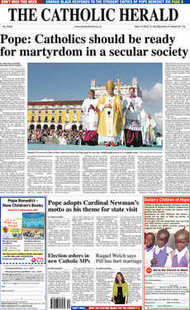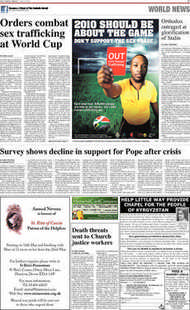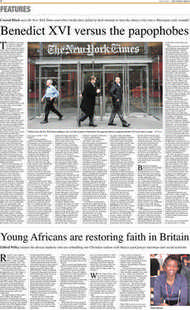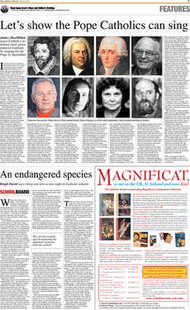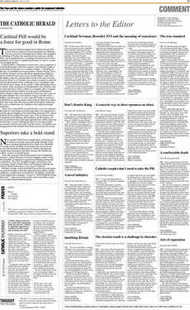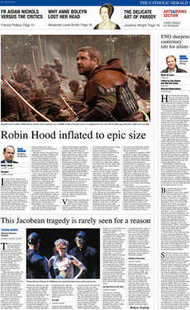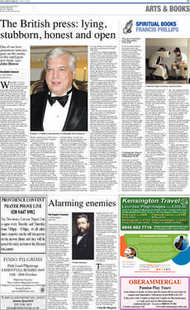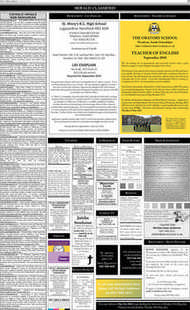Page 13, 14th May 2010
Page 13
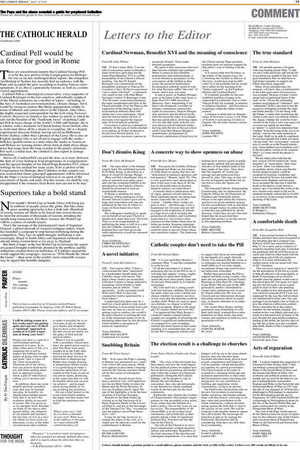
Report an error
Noticed an error on this page?If you've noticed an error in this article please click here to report it.
Tags
Share
Related articles
Debating Newman
‘hitler’s Pope’ Author Criticises Pope’s View Of Newman
At Vatican Ii, The Church Jumped Away From 19th-century...
Newman, Conscience And The Pope: A Debate With Consequences
It Is Wrong To Invoke An Imaginary ‘spirit Of John Henry...
You Don’t Have To Be A Newman Scholar To Write About His...
Cardinal Newman, Benedict XVI and the meaning of conscience
From Mr John Wilkins SIR – Fr Ker’s letter (May 7) on the role of conscience seems to breathe a more restrictive spirit than did the future Pope Benedict XVI in a 1968 presentation of the Church’s official teaching. The then Fr Joseph Ratzinger was commenting on the remarkable statement in Vatican II’s Gaudium et Spes 16 that in conscience “one is alone with God” – a statement very much in line with John Henry Newman’s belief. Fr Ratzinger wrote: “For Newman, conscience represents the inner complement and limit of the Church principle. Over the Pope as the expression of the binding claim of ecclesiastical authority there still stands one’s own conscience, which must be obeyed before all else, if necessary even against the requirement of ecclesiastical authority.” Conscience is prior to ecclesiastical authority. In the case of truths attached to revelation, as Fr Ker explained in his previous Herald article, it is conscience that convinces a person to accept the Gospel. These truths demand acceptance.
My point is that conscience does not then become cramped and confined. When it comes to non-infallible propositions and condemnations, a crucial element is acceptance by the consciences of the faithful as they assess the practical implications. Ecclesiastical authority needs to wait for what Newman called “the echo” of assent. And it may not come.
A case in point, as Stephen Morgan notes in his letter in the same issue, is Pope Paul VI’s 1968 encyclical Humanae Vitae. Interpreting it for those who disagreed, a number of bishops’ conferences stressed the rights of conscience. Deacon Morgan may not know that the Herald at the time did much the same. It is alleged that one parish priest, receiving copies of it for sale that week, took his scissors and excised all editorial matter, leaving only the text of the encyclical itself. I trust that Deacon Morgan’s anachronistic juxtaposition of Newman’s profession of loyal love for the Church and the Pope and their teaching does not indicate support for that priest’s way of dealing with the crisis.
Is it conceivable that Newman, as the author of the famous essay On Consulting the Faithful in Matters of Doctrine, would have had no difficulty? Is it not probable that he would have called for the teaching to be “better expressed”, as did Cardinal Martini and Cardinal Hume?
It is entirely possible for the noninfallible teaching of popes to be superseded or corrected. That is what Vatican II did, for example, in relation to religious freedom – and Newman is sometimes called the father of that council.
I continue to think that no interpretation of Newman’s Letter to the Duke of Norfolk is convincing if it fails to explain why the letter caused a furore in Rome.
Yours faithfully, JOHN WILKINS London SW1
blog comments powered by Disqus


